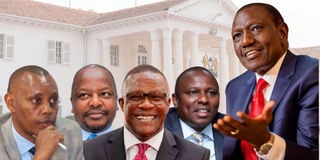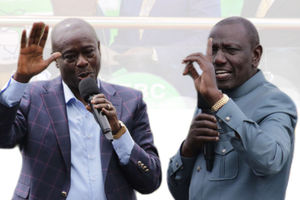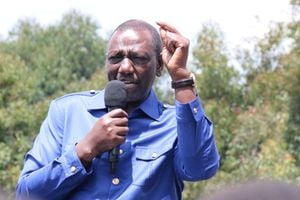
President William Ruto (right) and Belgut MP Nelson Koech (left), former Health CS Mutahi Kagwe, Former ICT CS Eliud Owalo and National Assembly Majority Leader Kimani Ichung’wah.
A Cabinet reshuffle is looming with fresh details indicating that President William Ruto could split the Roads and Transport docket to take care of competing political interests.
President Ruto will also be seeking to fill the vacant Interior and National Administration portfolio.
In splitting the docket currently under Cabinet Secretary Davis Chirchir, the President is said to be mulling doing away with the Gender and Culture docket to keep with the constitutional provision of “not fewer than 14 and not more than 22” ministers.
Two new ministers who were brought in after the dissolution of the Cabinet in July could also be moved over ‘performance concerns.’
State House sources indicated that the State Department of Gender could be merged with the Public Service and Human Capital Development docket while the Department of Culture could be moved to the Tourism Ministry.
“We had expected the changes to be made as early as last week. Chances are the announcement would be made anytime,” a State House source said.
Interior and National Administration fell vacant after the elevation of Prof. Kithure Kindiki to be the country’s second-in-command. The Gender docket has also been vacant after MPs rejected Stella Soi, who had been nominated to the position.
Mr Chirchir, a close ally of President Ruto, is one of the people being considered for the powerful Interior docket.
Mr Chirchir, a close confidant of the President, was moved from the Energy and Petroleum ministry to the current docket when the President constituted the broad-based Cabinet.
His shuffling was seen as a promotion at a time when some of his colleagues who made a comeback were moved to less lucrative dockets.
Belgut MP Nelson Koech, who is also the chairperson of the National Assembly’s Committee on Defence, Intelligence and Foreign Relations has also been mentioned as a possible nominee for the docket.
Other names that have since emerged as possible nominees to the Interior include Prime Cabinet Secretary Musalia Mudavadi, whose allies openly asked the President to consider him. He is currently holding the position on an interim basis.
Flex political muscle
National Assembly Majority Leader Kimani Ichung’wah has also been mentioned. But the President is said to be uncomfortable with the idea of appointing any elected leader from Mt Kenya to the executive, as it would give former Deputy President Rigathi Gachagua a platform to flex his political muscle in the ensuing by-election. However, some electoral seats are vacant because the electoral commission is not constituted to oversee the parliamentary and ward by-elections.
The region is currently seen to be hostile to President Ruto following the impeachment by Mr Gachagua as well as the feeling that the administration has not delivered on its pre-election promises.
Also lobbying for the slot is Environment CS Aden Duale. Mr Duale was moved from the powerful Defense docket to the current docket. He is among close allies of the President who resigned from their Parliamentary seats to join the executive.
The State House sources further indicate that President Ruto is keen to avoid the dominance of the National Security Council with members of the same ethnic community.
Article 240 of the constitution establishes the National Security Council, consisting of the President, Deputy President, three Cabinet secretaries in charge Defense, Foreign Affairs and Internal security, as well as the Attorney-General, Chief of Kenya Defence Forces, Director-General of the National Intelligence Service, and the Inspector-General of the National Police Service.
The current members of the council include; President Ruto, DP Kindiki, Defence CS Soipan Tuya, Prime Cabinet Secretary Mudavadi who is in charge of Foreign and Diaspora Affairs and Attorney General Dorcas Oduor. Others are CDF Charles Kahariri, NIS Director General Noordin Haji and IG Douglas Kanja.
With already three members of the council coming from the Mt Kenya region, President Ruto is said to be likely to give the slot to a different region.
Sources further indicated that the President was mulling tapping an ally of former President Uhuru Kenyatta into his Cabinet. Former Health Cabinet Secretary Mutahi Kagwe has since been mentioned for possible consideration.
Mr Kagwe, and Deputy Chief of Staff in the Executive Office of the President responsible for Performance and Delivery Management in Government, Mr Eliud Owalo have been mentioned as possible nominees to take up Transport and Roads dockets, in the event they are split.
Valuable asset
Mr Kagwe is seen as a valuable asset because of his performance record when he was in charge of the Health docket during the Covid-19 pandemic. His possible tapping into the Executive is also seen as part of Dr Ruto's plan to appeal to the emotions of the Mt Kenya region following Mr Gachagua’s impeachment.
It would be a comeback for Mr Owalo, who was dropped when Dr Ruto reconstituted his Cabinet. Mr Owalo was credited for making the Information, Communication and Technology docket vibrant. It was during his tenure that the government on-boarded most of its services on the e-Citizen platform.
Dr Ruto brought back Mr Owalo to the public service by mandating him to be in charge of both the Public Service Performance Management Unit and the Government Delivery Unit.
This is even as the Public Service Commission (PSC) closes applications for the vacancies for Principal Secretaries’ positions on Wednesday (December 4). The PSC last month called for applications for the PS positions, in what signalled an inevitable reshuffle of the Principal Secretaries, with those perceived to be allies of Mr Gachagua likely to be shown the door.
Article 155 (a) of the constitution mandates the PSC to recommend to the President suitable persons for nomination and appointment as Principal Secretaries.
“Following various reassignments within the senior ranks of the executive, a vacancy has arisen with the ranks of Principal Secretaries,” said PSC in the advert. Interested individuals have until December 4.
President Ruto and Mr Gachagua swept to power on the voting strength of their Rift Valley and Mt Kenya, a scenario that saw them pick a majority of top government officials, including PSs, from the two regions.










